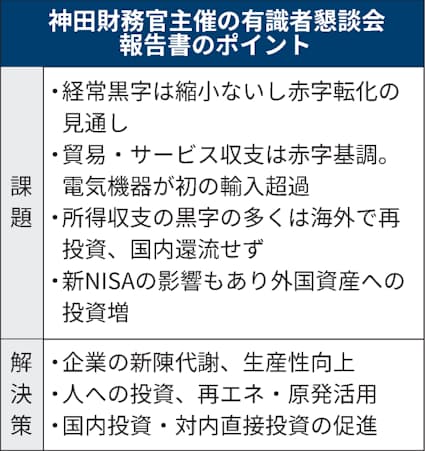黒田日銀の量的緩和はなぜ産業空洞化を招いたのか ― 池田信夫blog https://t.co/4AbFSKvhM9 pic.twitter.com/r10ARgHGD5
— 池田信夫 (@ikedanob) July 4, 2024
今 の状況 を是正するために は為替管理なんかやったってしょうがない わけですよ 要するにその円安の原因になっ てる海外への資本流出を止めなきゃいけ 11:11 ないでそのためには日銀の利上げだけでも これダメでもう日本のそ経済政策をですね 根本的に見直さなきゃいけないこの懇談会で 言ってんのは例えば対内投資をもっと 増やせということを言ってます
国内投資増やしてMade in Japan を増やせ、で決まりだな。
日本のMMTer と矛盾していないだろう、これは?
バイデン現象だな。「デフレ脱却」って間投詞になってるの?同じ質問の中に、まさにインフレのために起きている「実質賃金のマイナス」を混ぜ込んでくるし、冒頭の「新紙幣」と接続詞の繋がりもない。
— Spica (@CasseCool) July 4, 2024
質問となると、バズワードをテキトーに混ぜるだけになてるんだろね。多くの記者はもうAIに勝てない。 https://t.co/KOMr95RatR
嘘情報は否定し、真実をしつこく拡散する必要がある。スウェーデンの性犯罪の増加と移民の因果関係は否定されていますhttps://t.co/KUrBZ5ePjg
— Spica (@CasseCool) July 4, 2024
そもそもスウェーデンに「世界一治安の良い国」と言われた時代は存在しない。伝統的に犯罪率は欧州内ではやや高い方。日本やシンガポールとは比較にならない。https://t.co/FbtMzHm8sQ https://t.co/iJTi7fWYHD pic.twitter.com/roIo7IDXDY
鈴木宗男がソースとしているデイリー新潮の2023年5月の記事に続報ないのだが、動画に登場するジャヤンタ・マルダケ・スガット・クマラ氏とは:2000年に来日。日本人と結婚していたが離婚して在留資格を喪失。難民申請するも2020年3月に東京入管に収容される。施設内でCOVIDに2回感染。2021年10月に集団… https://t.co/Zl0BarSXZW
— Spica (@CasseCool) July 3, 2024
私たちの 野党案 議員立法は前科のあるなしで 判断基準を変えるという立場にわたって 02:11 おりません 先ほどの法務大臣が答弁されました前科が あることで危惧があるという答弁をされた 私たちはそのとご答弁その姿勢に危惧を 持っております前科がある方々と言っても 経緯に服されてそして罪を償われた方々 そういう方々は日本人であれ外国の方で あれそれはしっかりやっぱりその 罪を 償われた後の対応というのはやはりご本人 たちが社会復帰生活の安定を求められるの であればそこにしっかり 支援をしていこう
立憲が政権を取れない所以だな。
自衛隊機乗せて強制送還すべきだろう。
昨日のデイリー新潮でですね入管を改正で ですね スリランカ人男性が2度も起こしていた性 犯罪中のでですね ニュースになってますけども東京出入国 在留管理局から 仮放免を許可された40代のスリランカ人 男性が 過去に強制わいせつ地方罪と
06:25
致傷罪で2度有罪判決を受けていたものが デイリー新潮の取材でわかった 男性は2度の服役後東京入管に収容体調 不良を訴え続け2022年4月に 仮釈をされてからは関東省で 暮らしている これまでに男性は3度 難民 民生 認定申請をして強制送還を 免れていたという 報道があります
このことだな?
天下の新潮さんですから ですね私は間違いないと思いましたしかし 一方的な情報ではいかんと思って私は 新潮の 編集の一番の責任者にも確認をしたらこれ は事実です間違いありません法的措置や プロならば堂々と受けて立ちます
西山次長
具体的にお尋ねいただいているところで ありあえて申し上げればお尋ねにつきまし ては当庁の把握するところと明らかな齟齬 はございません
まあ、本当だ、と考えるほうが合理的だろうな。
All three men cited the fight against illegal immigration, which has long been a pressing concern for them, as well as transferring more powers from Brussels back to member states.
労働者と外国人
1. **Record-Breaking Tourism in 2024**: 2024 is expected to see a surge in tourism, with an estimated $11.1 trillion contributed to the global economy and 1.5 billion tourists traveling, significantly impacting destinations like Barcelona, Paris, Hawaii, and Bali.2. **Negative Impacts of Overtourism**: The influx of tourists can harm local residents and the environment, causing issues like rising short-term rental prices, pushing locals out, and environmental damage, such as water scarcity and competition with local farmers.3. **Social Media Influence**: Social media has intensified overtourism by popularizing specific locations, leading to local authorities in places like Mount Fuji and Hallstatt taking measures to limit tourist access to maintain the environment and community.4. **Economic and Environmental Concerns**: While tourism generates significant revenue, much of it doesn't stay within local economies. Environmental concerns, such as water scarcity and climate change, further exacerbate the negative impacts on popular tourist destinations.5. **Responsible Tourism Solutions**: Measures like admission fees, dispersal of tourists to less crowded seasons, and promoting nearby alternative destinations are being implemented. The focus is on high-value, low-volume tourism to balance economic benefits with environmental and social sustainability.
オーバーツアリズムは世界的な問題なんだな。
入場料をとったり、時期場所を分散するしかないか?
1. **Misconceptions about China's Economy**: There are widespread misconceptions about China's economy, often fueled by geopolitical tensions and biased Western media. Contrary to popular belief, China has not abandoned socialism for capitalism despite having private companies and a stock market.
2. **Reforms and Economic Development**: China's economic reforms starting in 1978, led by Deng Xiaoping, were aimed at industrializing and advancing productive forces. These reforms included introducing some market forces while maintaining state control over strategic sectors, referred to as the "commanding heights" of the economy.
3. **Role of State-Owned Enterprises (SOEs)**: A significant portion of China's economy is still controlled by state-owned enterprises. These SOEs dominate key sectors like finance, infrastructure, and telecommunications, and are responsible for a substantial share of industrial sales and employment.
4. **Pragmatic Approach to Socialism**: China follows a model of "socialism with Chinese characteristics," emphasizing pragmatism and adaptation to its unique conditions rather than strictly adhering to other socialist models like that of the Soviet Union. This includes a focus on improving living standards and economic development over maximizing profits.
j
5. **Stock Market and Economic Priorities**: The Chinese government does not prioritize inflating the stock market as seen in Western capitalist systems. Instead, it focuses on real economic growth, improving living standards, and ensuring that private companies align with national interests. This includes strict regulation and potential severe consequences for corrupt practices among the wealthy.
中国は株式会社があるにもかかわらず、社会主義なのは、重要な企業は国営であり、民間の企業も国からの規制が厳しいので社会主義国家だと言われている、と。


0 件のコメント:
コメントを投稿